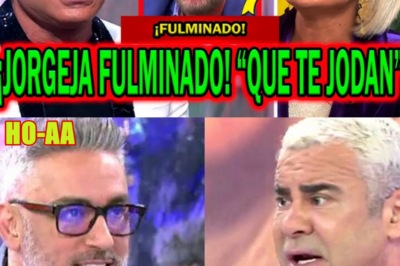Benzema ataca a Lamine Yamal en directo, ¡La respuesta de Yamal hace temblar a España! | HO

In a moment that electrified Spanish television and sent shockwaves through the world of football, Karim Benzema, one of the sport’s most controversial stars, faced off live with Lamine Yamal, the young prodigy hailed as the future of Spanish football. What began as a pointed interrogation turned into a lesson in dignity, identity, and the true meaning of solidarity—leaving an entire nation in awe of Yamal’s maturity and depth.
A Live Showdown
The lights of Tele5’s prime-time studio burned bright, the atmosphere tense as the audience held their breath in anticipation. Karim Benzema, known for his sharp wit and provocative style, entered the set like a boxer stepping into the ring. Across from him sat Lamine Yamal, composed, calm, and exuding a quiet strength that belied his youth.
The night was set for fireworks—and Benzema wasted no time.
The First Blow
“Lamine, let’s be clear,” Benzema began, his tone direct and unyielding. “When Pedri was criticized before Euro 2024, you said nothing. Why were you silent?”
The question landed like a punch. The studio fell silent. Yamal looked down for a brief moment, then met Benzema’s gaze. His voice, steady and controlled, cut through the tension: “I didn’t stay silent. I chose to wait. Speaking out in anger only makes things worse. Sometimes silence protects more than words.”
Benzema pressed on, “Pedri is almost like a brother to you. He was attacked, and you didn’t defend him publicly—not a tweet, not a post.”
Yamal’s response was unwavering. “What happens between us isn’t for the cameras. I called Pedri. We talked, honestly. He knows I’m there. Friendship isn’t about Instagram posts.”
The crowd, hanging on every word, sensed the rising stakes.

Identity Under Attack
But Benzema wasn’t finished. He shifted to a more personal attack. “You’re adored everywhere, but when it comes to African football, you’re silent. Have you forgotten your roots?”
A murmur ran through the audience. Yamal, unfazed, replied, “What you don’t understand is that the quiet things weigh more than the ones on display. Africa is in me—it’s not just a shirt I wear.”
Benzema, relentless, demanded specifics. “Guys like Mané or Salah, they act. What about you?”
Yamal leaned forward, a flicker of a smile on his lips. “Two years ago, I financed a football school in Morocco—no big name, no press. I paid for tournaments in Gambia, helped train young coaches in Tunisia. No selfies, no headlines. I do it in the shadows so those kids feel strong—not so they thank me.”
The studio was silent, the respect palpable.
Why Not Shout It Out?
Benzema, now more curious than combative, asked, “But why not tell the world? You could inspire others.”
Yamal shook his head, visibly moved. “Help isn’t an ad campaign. Africa isn’t a background for me to look important. My father told me stories of playing barefoot in Nador. If you think I’ve forgotten where I come from, you don’t know what it’s like to have two hearts beating together.”
His voice trembled for the first time. “Africa is my flesh, my memories, my strength—not a slogan.”
A Star Who Shuns the Spotlight
Benzema tried a lighter tone. “Lamine, you’re a global star, but you’re a ghost on TV. No interviews, no shows. Are you afraid?”
Yamal’s answer was simple and authentic. “Afraid? Never. At home, we spoke little, but every word mattered. The spotlight isn’t my world. I let my actions speak.”
Benzema pushed, “Your fans adore you, but you stay invisible. Why?”
Yamal smiled. “I love my fans deeply, but I’m discreet. I don’t need the spotlight to live. What I do, I do behind the scenes, where it matters. Silence isn’t emptiness—it’s a weapon. Those who care know I’m there, even if I don’t make waves.”
Politics and Division
Benzema upped the stakes: “You’re a god for millions—Spaniards, Moroccans, kids from the barrios. But politics? Nothing. Why don’t you take a stand?”
Yamal crossed his arms, thoughtful. “Because I don’t want to divide people. Politics draws lines and builds walls. I talk to everyone, not just one side.”
Benzema insisted, “With your voice, you could unite people. Why keep it caged?”
Yamal nodded, acknowledging the weight. “I know, and it’s not easy. But I help in my own way—schools, clubs, hospitals—no banners, no speeches. For me, real politics is action, not talk. People in need don’t want my opinions—they want a helping hand.”
National Allegiance Questioned
Then came the knockout question: “Why did you turn down a bigger role with the Spanish national team? You could have made the nation tremble.”
Yamal’s answer was direct: “I don’t play to please. Playing or coaching isn’t a medal—it’s a flame, something real. What they offered wasn’t that. I said no to a false promise, not to Spain.”
Benzema, impressed, pressed on, “But imagine—Spain at your feet, the stadiums roaring. Wasn’t that enough?”
Yamal’s smile was tinged with sadness. “I’ve had the applause. I want meaning. Spain is in my skin, I’ve defended it with everything. But I won’t sell my dreams for a role. I’m free, and I’ll stay that way. If it fits one day, I’ll return—but not to pretend.”
The Roots of Identity
Benzema tried to corner him one last time. “Your roots are Moroccan, everyone knows it. But you never talk about it. Why the mystery?”
Yamal’s gaze was strong yet gentle. “Morocco isn’t an anecdote—it’s my blood, my father’s stories, my mother’s food, the streets of Barcelona I grew up on. I love it quietly, not for the microphones.”
Benzema pressed, “A word from you would make millions happy.”
Yamal stood firm. “I go to Morocco, I help schools, families, clinics—but without fanfare. Too many parade their roots when it suits them. I’m not that guy. My father said, ‘Honor Spain, but keep Morocco in your soul.’ I’m a child of both. They both live in me.”
Solidarity Without Spectacle
Benzema, relentless, added, “Everyone takes a stand these days. You say nothing—people think you don’t care.”
Yamal closed his eyes, then opened them, resolute. “Not caring? I act, but not under the spotlight. Real solidarity doesn’t need a sponsor.”
“Give me an example,” Benzema challenged.
“I bought land in Tetouan for kids to play, funded training for young coaches, sent supplies to hospitals—no VIP parties. Why not announce it? Because if I do, it becomes a show. The people I help deserve more than that.”
A Final Lesson
Benzema, almost admiring, asked, “So why finally show yourself now?”
Yamal stood, scanning the room. “Because I’m tired of being judged for what I don’t say. I grew up with Spain and Morocco in my skin and I’ve always given back in my own way. What I do for kids, for hospitals, for the forgotten, isn’t for social media. It’s just what’s right.”
He looked at the audience. “They say I don’t move, but I fight every day, my way, without applause. I’m not here to shout—I’m here to pass the baton. And when I leave, it’ll be with a light heart, knowing I did what I had to, as a free man.”
The studio was silent. Benzema, for once, was left speechless. The applause started softly, then thundered. Yamal, standing tall, had shown Spain—and the world—that true greatness lies in humility, action, and the courage to be oneself.
News
ÚLTIMA HORA! HUNDEN A KIKO HERNÁNDEZ Y VIDEO OCULTO DE ROCÍO FLORES Y ROCÍO CARRASCO – CASA GEMELOS
La tarde de ayer se convirtió en uno de los momentos más comentados del año en el mundo del espectáculo…
¡ÚLTIMA HORA! GLORIA CAMILA Y RAQUEL BOLLO SEÑALAN A KIKO JIMÉNEZ EN FIESTA DE EMMA GARCÍA
La noche del viernes se prometía tranquila en la lujosa residencia donde Emma García organizaba su esperada fiesta anual, un…
¡NO AGUANTA MÁS! GLORIA CAMILA EXPLOTA CON ANA MARÍA ALDÓN EN FIESTA DE EMMA GARCÍA POR VESTIDO
La tarde del sábado prometía ser una velada agradable, llena de risas, copas y conversaciones animadas en la fiesta que…
¡FUERTE VIDEO HUNDE! A ROCÍO CARRASCO POR ANTONIO DAVID FLORES Y ROCÍO FLORES TRAS PERDER JUICIO
El mundo del espectáculo español volvió a temblar ayer cuando un video se filtró en las redes sociales, dejando a…
¡MAL DÍA PARA! KIKO HERNÁNDEZ PALIDECE CON ABOGADO DE ANTONIO DAVID FLORES TRAS ROCÍO CARRASCO
El martes comenzó como cualquier otro en el mundo del espectáculo español, con los colaboradores de “Sálvame” preparando sus guiones…
¡ÚLTIMA HORA! HAN FULMINADO A JORGE JAVIER VÁZQUEZ Y MENSAJE URGENTE DE KIKO HERNÁNDEZ
La tarde del martes comenzó como cualquier otra en el mundo del espectáculo español, con rumores y titulares que volaban…
End of content
No more pages to load












